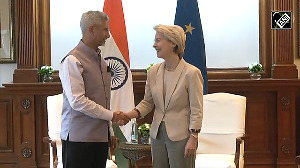South Korea's amazing run to the 2002 World Cup semi-finals struck a nerve in communist North Korea.
Previously, North Korea's shock quarter-final appearance at the 1966 tournament in England had stood as Asia's best achievement at a World Cup.
After Dutchman Guus Hiddink led co-hosts South Korea to the last four in 2002, officials in the North offered muted congratulations while pointedly reminding the South that they had set the benchmark 36 years previously.
"Aside from the political differences, there is a great sports rivalry between North and South Korea," Asian Football Confederation (AFC) general secretary Peter Velappan told Reuters.
"After the South finished fourth at the previous World Cup, the North definitely wants to match up."
A few months after the 2002 World Cup, reclusive North Korea launched a FIFA-sponsored project to develop soccer in the impoverished country.
It has brought swift rewards, with North Korea through to the final round of Asian 2006 World Cup qualifying following their return from the wilderness.
They begin their campaign with a politically explosive clash against Asian champions Japan in Saitama on February 9.
"It would be 40 years since North Korea first put Asian football on the map and they believe it is a good time for them to return to the limelight," said Velappan.
North Korea stunned the world by reaching the 1966 World Cup quarter-finals, beating Italy 1-0 on the way and taking a three-goal lead before bowing out to Portugal 5-3.
SURPRISE RUN
Their run to the final round of 2006 qualifiers was also something of a surprise, with North Korea edging out Thailand, Yemen and the United Arab Emirates to win Group Five.
Japan, Iran and Bahrain represent a sterner challenge for North Korea in the deciding round of qualifiers but with Asia's generous allotment of berths, they cannot be counted out.
The top two teams from each group advance to the 2006 finals in Germany with the two third-placed teams meeting in a two-legged playoff.
The winner will then face a further playoff against a team from the CONCACAF zone to earn a possible fifth Asian spot.
Malaysian Paul Mony, one of two development officers charged with establishing FIFA's "Goal Project" in North Korea, praised the country's youth development policy.
"During my many visits to Pyongyang, I have always seen active participation of youth players as well as club teams," he said.
"They face many difficulties...because (the) stadiums cannot be used during heavy winter conditions, which last around four to six months every year."
ARTIFICIAL SURFACE
In late 2002, FIFA financed the renovation of the 100,000-capacity Kim Il-sung national stadium in the North Korean capital Pyongyang, laying a revolutionary artificial surface.
A new training complex outside Pyongyang with a fully equipped gymnasium and a spacious building for the North Korean football association followed.
North Korea's recent success has not been limited to men's football. Their women's team are the Asian champions and the youth team have qualified for this year's world under-17 championship in Peru.
"It shows that they really mean business," said Velappan. "The last few years, they have really put a lot of emphasis on youth and the results are paying dividends."
North Korean officials have also been working overtime to prepare for the final round of qualifying matches, earning praise from an AFC inspection team in Pyongyang last week.
"We had a very good trip," competition director Carlo Nohra told Reuters. "We saw the stadium in daylight as well as at night to test the floodlights. If the best score is five, they'd get a four."








 © 2025
© 2025